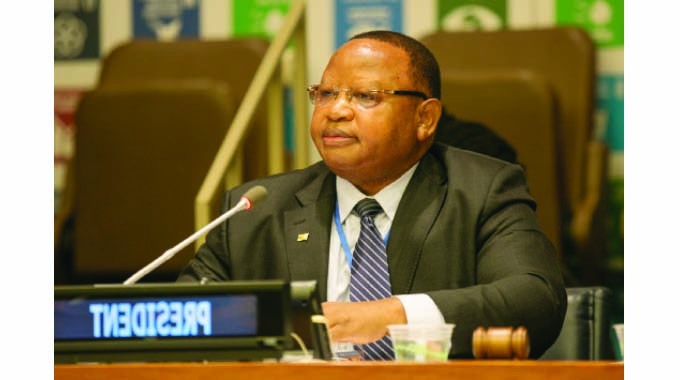The Chronicle

A TEAM from the Commonwealth secretariat is in the country on a weeklong visit, part of a detailed process by the Club to consider Zimbabwe’s application to return into the fold.
The country withdrew from the club of mostly former British colonies in December 2003. That was at the height of the Government’s dispute with Britain over the implementation of the fast track land reform and redistribution programme. At that time, Britain has just mobilised her allies, the United States, the European Union (EU), Australia and Canada to impose a range of bi-lateral sanctions to punish the country for compulsorily acquiring land from white farmers and redistributing it to landless blacks. At that time also, the West was also openly supporting the then MDC and multiple non-governmental organisations in a bid to unseat the Zanu-PF Government. It was pressure against Zimbabwe from all angles.
 President Mnangagwa
President MnangagwaIn response, the party, at its conference in Masvingo in December 2003, adopted a resolution to pull out of the Commonwealth. Days later, the Government formally withdrew the country from the organisation.
Between then and now, the Government intensified the implementation of the land reforms. It acquired more than 10 million hectares of land that, more than a century ago, was taken away from blacks by a combination of military conquest, plain force and unjust laws. Now, almost 300 000 blacks have been resettled on that land while a few hundred whites are still on it. Nineteen years on, the land redistribution exercise has been concluded what the Government is doing now is to consolidate it by supporting the new land owners. In June 2020, the Government, through the Global Compensation Deed, committed to paying compensation to the former farmers in terms of the Constitution, that is to say, it will pay restitution to the former growers for the improvements that they did on the land but not the land itself as it wasn’t bought in the first place, just forcibly taken away from blacks. The total bill is US$3,5 billion and authorities are actively working around to raise the sum.
Our relations with Britain, Europe, the US and other Western nations have improved remarkably, particularly since late 2017 when the Second Republic came into office. The EU is in formal dialogue with the Government and it has removed a good amount of its sanctions on the country.
The Second Republic’s application to be readmitted into the Commonwealth is consistent with its engagement and re-engagement policy; the standpoint that Zimbabwe wants to be a friend to all and an enemy to none.
In our view, the fact that the Commonwealth received Harare’s application is positive. Also, President Mnangagwa’s meeting with Commonwealth Secretary General, Patricia Scotland, in New York in 2019, was encouraging. The fact that the Club invited Zimbabwe to attend the Commonwealth Heads of Government Meeting (Chogm) in Rwanda, Kigali in June was yet another positive factor. That the Commonwealth has dispatched senior members of its secretariat to conduct consultations that are underway in Harare since yesterday is encouraging too. We don’t think if there was no light at the end of the tunnel, the Club would have even taken the effort to receive the Government’s application in 2018, invite Zimbabwe to attend Chogm in Rwanda as an observer and that Professor Luis Franschesci would have been in Harare as he is this week undertaking consultations.
These factors, as we have indicated, are positive.
“There is no perfect country in the world, not that we are aware of. There’s no perfect country in the Commonwealth, there’s no perfect nation, but there are countries that are resilient which are trying to do the right thing for their people. We have to realise in those 56 nations (Commonwealth members) and we are together with Zimbabwe, helping you to come back home,” said Prof Franschesci in Harare yesterday after he met Foreign Affairs Minister,
 Dr Frederick Shava
Dr Frederick Shava.
Indeed, Zimbabwe isn’t perfect. No country is. But Zimbabwe is trying. It is a more open democracy, has nothing to hide, wants to be friends with everyone, wants to engage and reengage on the basis of mutual respect. Whatever challenges made relations between Harare and the Commonwealth, and by extension, the West, poor, are now water under the bridge. The time has come for the country and the West to chart a new, amicable and more productive relationship.
Article Source: The Chronicle
